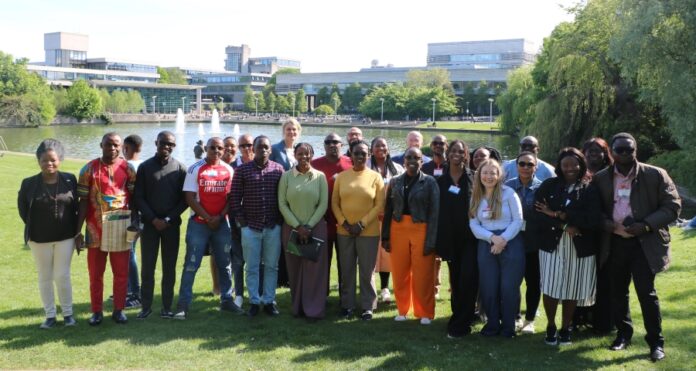DUBLIN, IRELAND – 8 May 2025 – A cohort of 22 emerging agrifood leaders from Lesotho, Rwanda, and Sierra Leone have completed a pivotal study visit to Ireland under the auspices of the FAO HASTEN initiative—Harnessing SDG-based Agrifood System Transformation through the Empowerment of the Next-Generation of Agrifood Leadership in Africa. Held from 28 April to 3 May 2025, the visit marked a significant milestone in advancing youth-driven transformation of agrifood systems across Africa.
The week-long visit was hosted by Sustainable Food Systems Ireland (SFSI), a collaborative platform comprising five Irish government bodies and led by Ireland’s Ministry of Agriculture, Food and the Marine. This immersive experience provided participants with in-depth exposure to Ireland’s highly coordinated, innovative, and sustainable agrifood system—characterized by inclusive governance, multi-stakeholder collaboration, and science-driven policy integration.
“This visit is not just a learning journey—it’s a launchpad for transformation,” said Stefanos Fotiou, Director of the FAO Office for the Sustainable Development Goals. “We are cultivating leaders equipped with the systems thinking, collaborative mindset, and technical knowledge needed to drive sustainable, SDG-aligned change in their home countries.”
Deep Dive into Ireland’s Agrifood Innovation Ecosystem
Participants engaged with a diverse range of Irish institutions at the forefront of agrifood innovation and sustainability. These included:
-
Department of Agriculture, Food and the Marine
-
Teagasc (Irish Agriculture and Food Development Authority)
-
Bord Bia (Irish Food Board)
-
Enterprise Ireland
-
University College Dublin (UCD)
The group visited farms practicing regenerative, climate-smart, and technology-enhanced agriculture, providing firsthand exposure to nature-based solutions, emission-reduction strategies, biodiversity enhancement, and integrated land use practices. The visits also highlighted Ireland’s robust agricultural extension systems that support farmers in adopting and scaling up sustainable innovations.
A Blueprint for Coordinated Agrifood Governance
A central theme of the study visit was the importance of coordinated governance and cross-sectoral integration. Ireland’s approach to aligning public institutions, academia, private enterprises, and research bodies around common food system goals left a strong impression on the delegates.
“The Ministry of Agriculture cannot build a resilient food system alone,” reflected Maleloko Molefi, Deputy Principal Secretary in Lesotho’s Ministry of Agriculture and Food Security. “This visit helped me understand the value of a national strategy that brings all actors to the table.”
“The synergy between the government, private sector, and academia here is inspiring,” said Franklyn Belmoh of Sierra Leone’s Scaling Up Nutrition and Food Systems Coordination Unit. “It’s a model that drives inclusive innovation and bridges knowledge gaps—something we need to replicate at home.”
Spotlighting Youth and Women-Led Agripreneurship
The delegation explored models of green entrepreneurship, with a particular focus on youth and women-led ventures. These initiatives showcased the potential of peer-led innovation ecosystems to accelerate transformation and unlock opportunities for young Africans in agriculture.
“I’m inspired to build a youth agripreneurs’ community back home,” said Adja Fatou Diop Ndiay, a Sierra Leonean entrepreneur. “When young people support each other, share visibility, and hold each other accountable, real change happens.”
Education, Research, and Community: A Tripartite Approach
Ireland’s integration of scientific research, higher education, and community engagement emerged as a powerful framework for sustainable food systems. The delegation explored how universities, research centres, extension services, and rural communities are interlinked to ensure that innovation is locally relevant and impactful.
“Science, education, and community engagement must go hand-in-hand,” emphasized Lisa Raisa, Lecturer at the Rwanda Institute for Conservation Agriculture. “This trip confirmed that collaborative, community-based learning is key to transformation.”
Laying the Foundation for Local Action
The study tour concluded with each participant formulating personal and national action plans, grounded in the Irish experience but tailored to the specific contexts of Lesotho, Rwanda, and Sierra Leone. These plans emphasize:
-
Improved inter-institutional coordination
-
Enhanced youth and women’s empowerment
-
Expansion of public-private-academic partnerships
-
Integration of transdisciplinary approaches in national food systems planning
The FAO will continue to support these leaders through peer-learning networks, national capacity-building workshops, and a regional lecture series later in 2025. These follow-up initiatives will focus on:
-
Creating supportive ecosystems for agrifood SMEs
-
Strengthening stakeholder engagement strategies
-
Translating lessons from Ireland into actionable local strategies
“This visit embodied the values of the HASTEN initiative—systems thinking, inclusive governance, and collaborative leadership,” said Hajnalka Petrics, Lead Technical Officer of the HASTEN Project. “Participants return not only with technical insights but also with renewed confidence, bold visions, and strong networks to drive sustainable change.”
About the FAO HASTEN Initiative
The HASTEN Project, an initiative of the Food and Agriculture Organization of the United Nations (FAO), is designed to catalyse transformational change in Africa’s agrifood systems by empowering a new generation of leaders. Implemented in Lesotho, Rwanda, and Sierra Leone, HASTEN promotes
-
Transdisciplinary systems thinking
-
Capacity development to analyze SDG interlinkages
-
Development of inclusive, accountable institutions
-
Strengthening of private sector contributions to sustainable development
The project is part of the FAO’s Flexible Voluntary Contribution (FVC) subprogramme and is anchored in strategic partnerships with national governments, academia, research institutions, investors, and youth-led enterprises. Through initiatives like this study tour, HASTEN is shaping a future where Africa’s agrifood leaders are not only equipped with knowledge but also empowered to lead transformational, SDG-aligned change.
















 The African Research (AR) Index is a comprehensive scholarly directory and database focused explicitly on journal publishers that publish and disseminate African research.
The African Research (AR) Index is a comprehensive scholarly directory and database focused explicitly on journal publishers that publish and disseminate African research.

